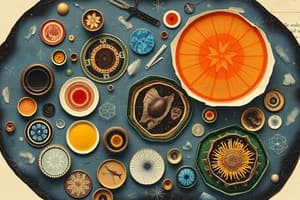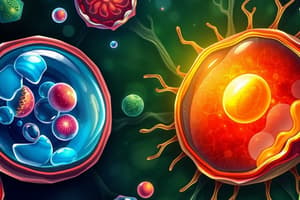Podcast
Questions and Answers
What is the nucleus?
What is the nucleus?
The control center of a cell that directs the cell's activities and contains the chemical instructions that determine the cell's characteristics.
What is the function of the nucleolus?
What is the function of the nucleolus?
It is the organelle where ribosomes are made, synthesized, and partially assembled.
What is cytoplasm?
What is cytoplasm?
A jellylike fluid inside the cell in which the organelles are suspended.
What does the centrosome do?
What does the centrosome do?
What is the golgi apparatus?
What is the golgi apparatus?
What is the function of lysosomes?
What is the function of lysosomes?
What is the cell membrane?
What is the cell membrane?
What does mitochondria do?
What does mitochondria do?
What is the function of vacuoles?
What is the function of vacuoles?
What are smooth ER?
What are smooth ER?
What are rough ER?
What are rough ER?
What are ribosomes?
What are ribosomes?
What is the cytoskeleton?
What is the cytoskeleton?
What are chloroplasts?
What are chloroplasts?
What is the cell wall?
What is the cell wall?
Flashcards are hidden until you start studying
Study Notes
Cell Organelles Study Notes
-
Nucleus: Acts as the cell's control center, regulating its activities and housing genetic instructions essential for its functions and traits.
-
Nucleolus: Located within the nucleus, this organelle is responsible for the production and partial assembly of ribosomes.
-
Cytoplasm: A gelatinous substance that fills the interior of the cell, providing a medium where organelles are suspended and engaged in cellular processes.
-
Centrosome: Situated near the nucleus, it is crucial for the organization of microtubules, which are vital for cell shape and division.
-
Golgi Apparatus: A key player in the cell's protein processing system, it modifies, sorts, and packages proteins for transport to various destinations within or outside the cell.
-
Lysosome: Containing digestive enzymes, lysosomes break down waste materials and cellular debris, primarily found in animal cells.
-
Cell Membrane: This semi-permeable barrier encases the cell, controlling the ingress and egress of substances, crucial for maintaining cellular homeostasis.
-
Mitochondria: Known as the cell's powerhouse, mitochondria convert nutrients into energy through cellular respiration, essential for various cellular activities.
-
Vacuole: A storage organelle that holds water, nutrients, and waste products; notably, plant cells have large vacuoles that help maintain cell turgidity.
-
Smooth Endoplasmic Reticulum (ER): Serves as a network of passageways for transporting proteins, devoid of ribosomes, and involved in lipid synthesis.
-
Rough Endoplasmic Reticulum (ER): Studded with ribosomes, this structure is involved in the synthesis and transport of proteins.
-
Ribosomes: These organelles are the sites of protein synthesis, translating messenger RNA into polypeptide chains.
-
Cytoskeleton: Composed of a network of fibers, it maintains cell shape, provides structural support, and facilitates cellular movement.
-
Chloroplasts: Exclusive to plant cells, chloroplasts harness sunlight to produce food through photosynthesis, containing chlorophyll, the pigment responsible for trapping light energy.
-
Cell Wall: A rigid outer layer found only in plant cells, it surrounds the cell membrane, providing structural support and defining the cell's shape.
Studying That Suits You
Use AI to generate personalized quizzes and flashcards to suit your learning preferences.




